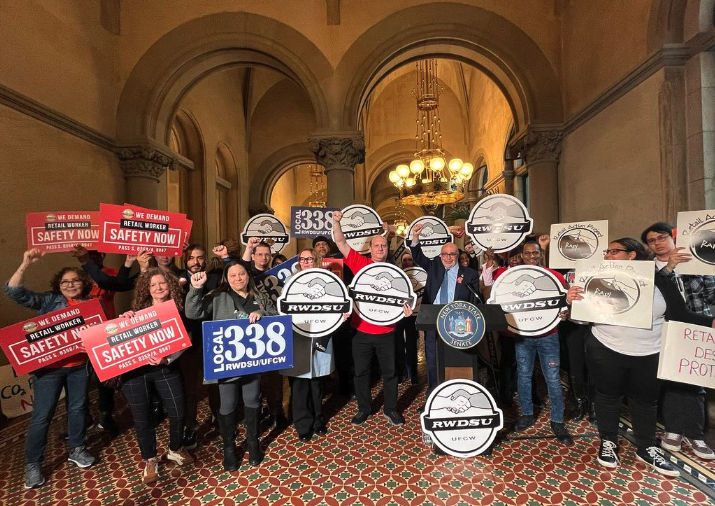On the afternoon of May 14, 2022, Jerome Bridges heard what he thought were firecrackers or a car backfiring outside the Tops supermarket where he works in Buffalo. An instant later the noises moved inside the store and it became clear that they were coming from bullets shredding metal and shattering glass in his place of work.
Bridges survived what the rest of the country would come to hear about as a racist mass shooting that killed 10 people in the upstate supermarket. On Wednesday, he shared the trauma of that day among a group of other retail workers who are pushing for a state law to provide increased protections against retail violence in the workplace.
“We weren’t prepared for that that day. We did not have the system we have now in the store that day,” Bridges said.
Bridges’ story is one particularly harrowing example of several experiences that members of the Retail, Wholesale and Department Store Union (RWDSU) shared about forms of violence they experience on the job — many of them more routine than Bridges’ experience.
The group, which assembled during Workplace Violence Awareness, called for the state legislature to pass the Retail Worker Safety Act, a bill that would require employers evaluate risk in their workplace, develop a violence prevention plan, provide ongoing safety training, document incidents and require the installation of panic buttons in workplaces of fifty or more people.
In a survey of RWDSU’s members on workplace violence, 88% of them said they would feel safer if a silent panic button was installed. The union is pushing for the bill, sponsored by state Senator Jessica Ramos and Assemblymember Karines Reyes, to be passed this session.
“We as workers are the first line of people who have to deal with that before managers or security becomes involved. And we don’t have sufficient training. We don’t have sufficient practices in place to keep ourselves safe,” said Bear Spiegel, a bookseller at the newly unionized Barnes & Noble in Union Square.
Spiegel spoke as a trans person about the harassment that marginalized groups face in the workplace. “I had a customer who noticed my pronouns on my name tag and started berating me about pronouns, started telling me that I personally was ruining the family fabric of America,” he said. “We shouldn’t feel unsafe coming into our book-selling job every day.”
Lorraine Williams, an employee at Bloomingdale’s, said that she felt terrified and unprepared when she found herself working during an armed robbery.
“There’s no conversation, no training, so you don’t know what to do when you know something happens,” Williams said. “If we only had like a panic button or something to alert someone to let them know there’s something happening, maybe that could have helped out a little bit.”
She added that at her other job at a supermarket in Westchester, also represented by RWDSU, employees often find themselves the target of customers’ verbal harassment and other tense altercations that deescalation training would help resolve.
Eddie Quezada, the produce manager at a Stop & Shop on Long Island, said that he experiences similar problems and wants training to be comprehensive — not just a pre-recorded computer exercise. He has lobbied his employer also to hire a security guard — to no avail.
The bill would require employers to document every incident of retail violence that they will have to provide to the government upon request. If those stores reach a certain threshold of incidents, they would be required by law to hire a security guard during open hours.
“That’s what we’re looking for is a little bit more protection,” Quezada said.







